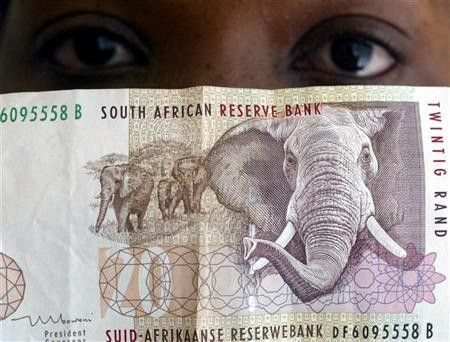S.Africa's rand heads for weekly gain, bonds mixed

South Africa's rand edged higher against the dollar on Friday and was on track for a weekly advance of more than 1.6 percent, with the market trusting the authorities will more likely act to support the currency, than let it depreciate.
The rand was buoyed by signs global leaders are committed to resolving euro zone debt woes and stemming any contagion to other regions, and took in its stride comments from Trade and Industry Minister Rob Davies that its recent sharp losses, was a move in the right direction.
The currency hit a 28-month low of 8.4950/dollar on September 22.
Government bonds were mixed after a lacklustre session, although sustained rand strength in the coming week could lure back offshore investors who have recently dumped local debt in favour of lower yielding but relatively safer assets like U.S. Treasuries.
The yield on the 2015 bond fell five basis points to 6.7 percent while that for 2026 bond edged up half a basis point to 8.39 percent.
The rand was trading at 7.84 to the dollar at 1600 GMT, up 0.48 percent from Thursday's New York close of 7.8780 although it was off Friday's session high of 7.8175.
I think most of the rand weakening has been done. I don't think it's going to weaken further unless we have another external shock. The fact that euro-dollar is moving up is also supporting it, said Murat Toprak, an EMEA strategist at HSBC in London.
What the government has said about the possibility of intervention has also played in the way that the rand has traded in the past few days.
The rand jumped as much as two percent on Wednesday after Finance Minister Pravin Gordhan signalled the government was ready to use forex reserves to stabilise the market, recently buffeted by global risk aversion over fears of defaults in some European countries.
The market took Davies's comments on Friday suggesting the currency was still overvalued and not competitive as more of the same rhetoric previously heard from the trade and industry minister, who overseas the manufacturing sector that benefits from a softer rand.
I think the main issue right now for the economy is to contain the weakness of the currency in order to avoid the negative implications on inflation, one Johannesburg currency trader said.
© Copyright Thomson Reuters {{Year}}. All rights reserved.





















